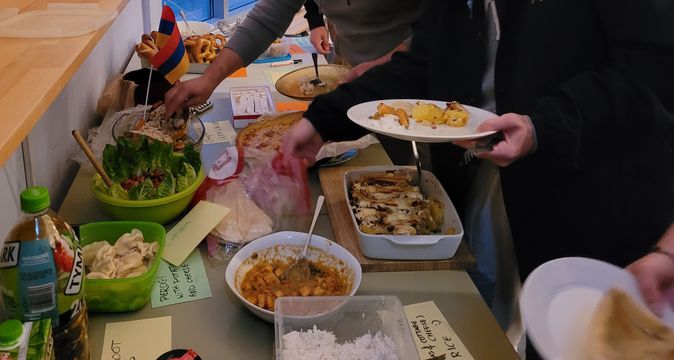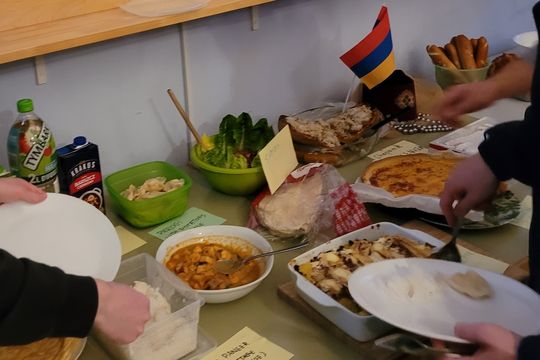These days, the International Center Hochschule Flensburg organized an international Dinner for foreign students, which aimed to introduce students to each other. Honestly, I didn't know that our university has so many multinational students, from Eastern Europe to Latin America, Africa and Asia. In Hochschule Flensburg foreign students study mostly in English, but there are also quite a few students who are studying in German. The most interesting part of the evening was the display of traditional dishes.
One of the conditions of the meeting was to prepare a traditional dish typical of your country in advance and entertain all the participants. And so that evening we tried everything: from Polish perogies to Indian rice and French galette-Bretagne. During the demonstration of the dishes, everyone was talking about the ingredients. I also prepared one of the autumn dishes typical of Armenian cuisine, called ghapama. It consists of a pumpkin filled with rice and nuts. Honey, which should be poured into the pumpkin before roasting, also gives the pumpkin a mild flavor.
Believing the feedback, many people liked the ghapa made by me, which is very healthy and can be eaten by vegans. Some of the dishes that were presented at our common table I had already tried before, for example Turkish lokhum and Arabic tabbouleh. Although the evening was mainly for foreign students, it was also nice to see German students who brought brizels and laugenstanges with them.
After dinner, we started playing board games that typify German culture. To be honest, I’m not much of a fan of board games and before coming to Germany I didn’t know any games except Monopoly. But the environment was very friendly and I played a few times as well
The party itself was accompanied by various other games too. Indians taught us to dance Indian dances, students from Arab countries showed us how to move to Arabic sounds. It was very interesting to dance to Turkish pop music or listen to French rap. Everywhere there was an atmosphere of universal solidarity and tolerance. Everyone was open to learning dances from other cultures, asking about traditions and talking about cultural differences.
It’s interesting that we study at the same university, but we would never have met if it wasn’t for such a cultural evening. Many students have just arrived in Germany and have very few acquaintances here. Evenings like this are very important for making friends․
In addition, the Study Buddy program is also active in our university, during the events of which German and foreign students have the opportunity to get to know each other, help each other and share their experience. During such an international evening, I also made new friends, with whom I communicate outside the university. As the organizers promised, such evenings will be regular and the number of participants will multiply.

